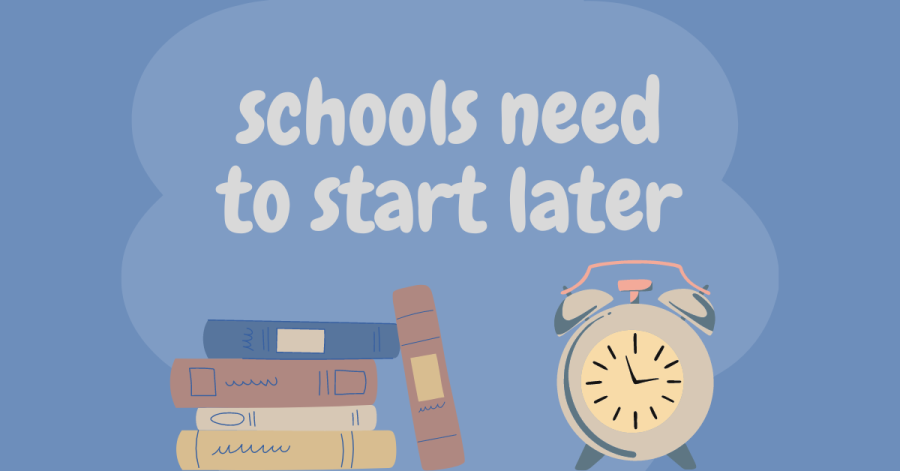The importance of schools starting later
Students begin classes much earlier than they should, resulting in a lack of sleep and performance in teens.
Many teens are not given the opportunity to perform to their best abilities because of school start times. Schools should make the shift to later start times to accommodate.
Millions of teens across the country wake up while it is dark outside in order to prepare for school. They are tired from the previous day but must be at school soon. Nearly half of the US’s public middle and high schools begin class before 8 a.m.
Numerous teens go to bed between 11 and 12 at night. If given the option, a large majority would choose to wake up between the hours of eight and nine in the morning, myself included. Schools starting so early makes it nearly impossible for us to get the recommended amount of sleep and allow for productivity. I work best when I have gotten proper sleep, so it is safe to assume many other high school students do too.
Eight to 10 hours is the recommended amount of time for the average teenager to get per night, but only three in 10 are predicted to meet this goal. The other seven are left getting less than eight hours of sleep, which in turn leads to hindered performance in school and other activities.
This poses the question, if students are not getting adequate sleep, why don’t they just go to bed earlier? That is not really the case when it comes to teen sleep. Everyone has a circadian rhythm, which is the behavioral changes that occur on a 24-hour cycle, sleep included. However, there is a major distinction between a teenager’s and everyone else’s. Children tend to naturally go to sleep around eight-nine p.m., but teens tend to fall asleep two to three hours later.
If school began later, many teens would get adequate sleep, resulting in more academic achievement. A good night’s sleep promotes sharper thinking, better memory and increased creativity. All of these are essential to teens in order to perform and function to the best of their abilities.
Students who do not get enough sleep will likely be drowsy and not pay attention to their schoolwork. Too often I see my peers asleep and nodding off during class, and sometimes I am one of them. This leads students to fall behind and perform poorly. Instead, schools should help their students by pushing back start times to allow for better learning.
Not only are teens waking up too early to function, but they are also commuting to school before fully waking up. This creates a dangerous and possibly life-threatening problem. Teen drivers already account for a large majority of vehicle accidents and are nearly three times more likely to get into a wreck. Now imagine early morning conditions such as low visibility coupled with drowsiness and lack of sleep: It is just a mess waiting to happen.
While there are many benefits to starting school later, there are also downsides such as after-school activities. Many students are involved in extracurricular activities that tend to take up a lot of time. With schools starting earlier, they are able to begin their activities earlier, thus allowing students more daylight at home. The same also goes for work; teens who work a job are able to fit in more working hours after school.
As a teenager in high school, I know I would choose a later start over any other option. More sleep and better academic performance sound more appealing than getting out of school earlier.








